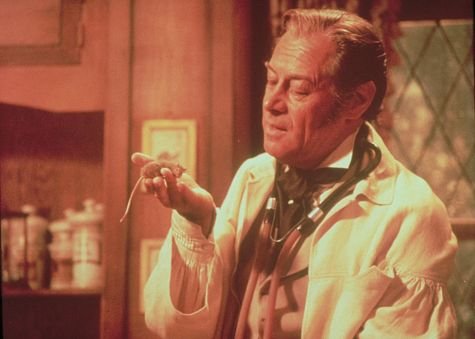
For animal lovers, there may be no one more heroic than Dr. Dolittle, the title character of Hugh Lofting’s charming children’s books and Richard Fleischer’s schmaltzy movie (one of my childhood favorites). Dolittle’s patients are people, at first, until they get fed up with his growing number of house pets — rabbits, mice, pigeons, a duck, an owl, and a baby pig, among others. (One lady inadvertently sits on a hedgehog sleeping on the sofa.)
Soon Dolittle has major money troubles, and is squandering his savings on food and care for all those animals. The future is bleak. Then one morning his parrot, Polynesia, teaches him how to speak bird. After some study, he can understand all of the animals. He becomes the best animal doctor in the world, goes on all kinds of fantastical adventures, and shows us the virtue of caring for all forms of life. Animal ailments, we learn, are a whole lot like human ailments.
I thought of the good doctor today after reading about a new conference called Zoobiquity that happened a couple of weeks ago in Los Angeles. More than 200 doctors and veterinarians met to talk about how the same problems — infections, cancers, heart troubles, even mental illness — affect different species. I wish I had been there; get a load of these session titles: Glioblastoma in an Alpaca and a School Principal; Diabetic Syndromes in New and Old World Monkeys; Obsessive-Compulsive Disorder in a Polar Bear and a Novelist.
The experts behind the meeting say that interest in comparative biology is waning. Although veterinary medicine and human medicine come together during panics — hello, E. Coli outbreaks — most of the time, they “operate in largely separate professional silos.” This is a shame, for one field can help inform the other in countless ways. I’ll give you two examples.
 The first is a story about Nicholas Dodman, a veterinary scientist at Tufts University. In the 1980s, Dodman noticed that many white, male Bull Terriers suffer from compulsive tail-chasing. (Yes, there’s a video, here.) Suspecting a genetic cause, he began collecting doggie blood samples from breeders and screening them for variants. Bingo. He found that compulsive dogs tend to carry glitches on chromosome 7, in a region that holds a gene called cadherin 2. The same family of genes has been linked to several human brain diseases, including autism.
The first is a story about Nicholas Dodman, a veterinary scientist at Tufts University. In the 1980s, Dodman noticed that many white, male Bull Terriers suffer from compulsive tail-chasing. (Yes, there’s a video, here.) Suspecting a genetic cause, he began collecting doggie blood samples from breeders and screening them for variants. Bingo. He found that compulsive dogs tend to carry glitches on chromosome 7, in a region that holds a gene called cadherin 2. The same family of genes has been linked to several human brain diseases, including autism.
The second story is about an $80,000 chicken. Last month, researchers from the Roslin Institute in Edinburgh (the same place that created Dolly the sheep) described transgenic chickens that don’t spread bird flu to other birds. The researchers engineered the chickens to carry a gene that somehow impedes the way the flu virus gets passed on to the next bird. Because some 80 percent of the world’s chickens come from two companies that sell purebred chicken lines, in theory, it wouldn’t be difficult to insert this particular genetic tweak into millions and millions of birds. And if you squelch the flu’s spread in birds, then you’d keep it from killing humans, too. (It turns out, of course, that there are serious political and economic caveats, but it’s still a neat idea.)
Neither of these discoveries would have happened without intense collaboration between animal experts and human experts. It makes you wonder how much more could be done if these “professional silos” were razed. It would certainly make Dolittle proud.
**
White Bull Terrier image courtesy of parl, via Flickr
One of the things that i wish my doctor would do is engage in some preventive medicine. He required a blood test to sign up, but didn’t schedule a follow up. I’m in pretty good health, but the blood test suggests i should exercise to get my good cholesterol higher. I should also lose a few pounds. But my doctor refused to give me the slightest hint. Is there some sort of liability issue?
Vets, on the other hand, mainly do preventive medicine. Many animals have better health than we do as a result.